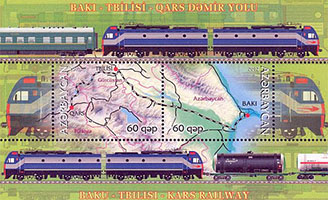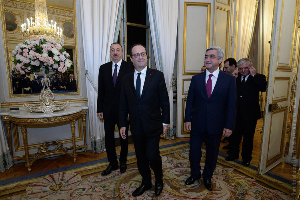Foreign Ministers of Turkey, Azerbaijan and Turkmenistan Discuss Energy and Transportation in Ashgabat
By Tavus Rejepova (03/04/2015 issue of the CACI Analyst)
Azerbaijan's, Turkey's, and Turkmenistan's Ministers of Foreign Affairs Elmar Mammadyarov, Mevlut Cavusoglu and Rashid Meredov gathered in Ashgabat on January 29 to discuss regional energy and transportation issues.
Cavusoglu, leading a big delegation, arrived in Ashgabat on January 28 to meet with President Berdimuhammedov and discuss the next day's trilateral meeting as well as Berdimuhammedov's expected visit to Turkey on March 3. Cavusoglu also met separately with his counterpart Meredov to discuss energy security, transportation and expansion of the current state of commercial ties. Turkey is Turkmenistan's main trade partner and Turkey represents the highest presence of foreign companies in Turkmenistan, at over 600 companies.
Mammadyarov met with President Berdimuhammedov on January 29 before the trilateral ministerial meeting and discussed enhancing commercial ties between the two countries. Referring to his last visit to Ashgabat five years ago, Mammadyarov expressed satisfaction with the current level of relations between Azerbaijan and Turkmenistan.
During the trilateral meeting between the ministers of foreign affairs, the sides discussed cooperation in the areas of trade, energy, transportation and education. In particular, the ministers stressed the Afghanistan-Turkmenistan-Azerbaijan-Georgia-Turkey transportation link project aimed at increasing trade and reducing cargo transit expenses among these countries, as an important objective. Representatives of these five countries met in Ashgabat in November 2014 over the draft agreement of this transport corridor.
Following the talks, the sides also decided to create a trilateral format for the oil and gas company representatives of the three countries. The ministers of Turkey and Azerbaijan reportedly invited Turkmenistan to join the Trans-Anatolian gas pipeline (TANAP) project, which envisages delivering gas from Azerbaijan's Shah Deniz field to Europe via Georgia and Turkey.
President Berdimuhammedov has stated earlier stated that the trans-Caspian pipeline, intended to bring Turkmen gas to Europe via TANAP, only requires the consent of two countries (Turkmenistan and Azerbaijan) whose seabed sectors these pipelines would cross. But Russia's Minister of Foreign Affairs Sergey Lavrov has stated that "the project of the trans-Caspian gas pipeline falls into the category of projects that affect the interests of countries that do not participate in it" expressing concern over the project. Maros Sefcovic, the European Commission's Vice President in charge of Energy Union, stressed the importance of addressing the technological and legal issues of transporting Turkmen gas to Azerbaijan in his address to reporters on February 12. Speaking at Turkmenistan's Oil & Gas Conference in Ashgabat in November 2014, Rovnaq Abdullayev, the CEO of Azerbaijan's energy company SOCAR, expressed readiness to provide Azerbaijan's developed infrastructure, diversified oil and gas pipeline network, warehouses and terminals, fleet of ships and other assets needed for implementing projects in the oil and gas industry to its neighbors in the region, primarily to Turkmenistan.
During the trilateral meeting in Ashgabat, Mammadyarov also met with Cavusoglu to discuss regional cooperation, highlighting President Ilham Aliyev's visit to Turkey on January 14-15, 2015.
The first trilateral meeting between the foreign ministers of Turkey, Azerbaijan and Turkmenistan took place in Baku on May 26, 2014, when the "Baku Statement" was released, expressing the three countries' determination to develop trilateral relations in various fields, particularly in energy, trade, transportation, culture, tourism, education and environmental protection through joint projects and cooperation initiatives.
As a result of the Ashgabat meeting, the foreign ministers signed a joint declaration and adopted a trilateral framework cooperation program for 2015-17. The foreign ministers also agreed to organize a trilateral meeting between the presidents of Azerbaijan, Turkey and Turkmenistan in Ashgabat, planned for October of 2015, which is expected to expand the trilateral partnership in energy, transportation and communication sectors to new levels. The next trilateral meeting between foreign ministers is slated to be held in Turkey.
CACI Analyst, February 18, 2015
CACI Analyst, February 18, 2015 (.pdf)
Contents
Analytical Articles
GYUMRI MURDERS THREATEN TO DISRUPT ARMENIA’S RELATIONS WITH RUSSIA, by Eduard Abrahamyan
SANCTIONS, ENERGY PRICES, AND RUBLE DEPRECIATION CHALLENGE CIS GOVERNMENTS, by Stephen Blank
DAGESTAN’S JIHADISTS AND HARAM TARGETING, by Emil Souleimanov
AZERBAIJAN INVESTS IN UPGRADING ITS TRANSPORT INFRASTRUCTURE, by John C.K. Daly
Field Reports
ARMENIAN PRESIDENT REJECTS TURKISH INVITATION TO ATTEND GALLIPOLI ANNIVERSARY, by Erik Davtyan
POLICE ARRESTED FOR OLD MURDER CASE IN GEORGIA, by Eka Janashia
KYRGYZSTAN DEBATES ELECTORAL SYSTEM REFORM, by Arslan Sabyrbekov
TAJIK PRESIDENT REVIEWS CHALLENGES IN ANNUAL ADDRESS TO PARLIAMENT, by Oleg Salimov
Azerbaijan Invests in Upgrading Its Transport Infrastructure
By John C.K. Daly (02/18/2015 issue of the CACI Analyst)
The Caucasian post-Soviet nations, led by oil-rich Azerbaijan, are expanding their rail, road and air networks to attract rising Eurasian trade. Speaking at Davos, Georgia’s Prime Minister Irakli Gharibashvili underlined the importance of the joint projects being implemented with Turkey and Azerbaijan, particularly the just opened Baku-Tbilisi-Kars (BTK) railway. Gharibashvili told his audience, “Once operational, it will reduce the period for shipment from China to European markets by more than half and shorten the distance by almost 7,500 km.” Given its energy revenues, Azerbaijan is the driving force behind these changes.

Azerbaijan Tightens Pressure on Domestic and Foreign NGOs
By Mina Muradova (01/22/2015 issue of the CACI Analyst)
As Azerbaijan prepares to host the first European Games this summer, new sport and non-sport venues are being constructed and infrastructure is being renovated. By investing millions to organize the games in just 30 months, Azerbaijan’s government seeks to promote the young Caspian state through an ambitious sport event.
However, against this backdrop, Azerbaijan’s government has intensified its crackdown on journalists and civil society representatives. Human Rights Watch issued a statement on January 20, saying that over the past year, the Azerbaijani government used a range of bogus criminal charges, including narcotics and weapons possession, tax evasion, hooliganism, incitement, and even treason, to convict or imprison at least 34 human rights defenders, political and civil activists, journalists, and bloggers, prompting others to flee the country or go into hiding. Following the prosecutors’ requests, courts have frozen the bank accounts of at least 50 nongovernmental groups and in some cases the accounts of their staff, as part of ongoing criminal investigations against several foreign donors.
Another human rights watchdog, the International Federation for Human Rights, stated that Azerbaijan has adopted aThe International Federation for Human Rights (FIDH), The International Federation for Human Rights (FIDH), The International Federation for Human Rights (FIDH), whole arsenal of “anti-NGO laws” since 2013. NGOs are henceforth compelled to register their organization with the government and their funds with the Ministry of Justice in order to receive funding (whether from inside or outside the country). Those who cannot or refuse to register their subsidies from abroad therefore break the law. The use of non-registered subsidies is now deemed to be an administrative offense and the judiciary considers the funds to be a source of taxable personal income.
The latest move to silence alternative voices was a police raid on the office of U.S.-funded Radio Free Europe/Radio Liberty on December 26, detaining journalists for hours. Former journalists of the station have also been questioned by police. Inspectors from the prosecutor’s office ransacked the company safe, seized computers, memory sticks, and documents, and sealed the office shut.
“This operation is clearly designed to block the activities of our Baku bureau and threaten our journalists,” Radio Azadliq director Kenan Aliyev told Reporters Without Borders. In a statement, Radio Azadliq co-director and Editor Nenad Pejic said: “The order comes from the top as retaliation for our reporting and as a thuggish effort to silence RFE/RL.” Prosecutors said the bureau’s work was to be terminated, but did not specify for how long.
Azerbaijani prosecutors have staged similar raids in recent months on other so-called foreign entities, including foreign nongovernmental organizations such as IREX, the National Democratic Institute, and Oxfam.
The Baku bureau of RFE/RL was shut down twenty days after the arrest of its prominent anchor Khadija Ismayilova. She is well-known as an investigative reporter who published several reports about government corruption and the business of the president’s family members. Ismayilova was detained for two months on heavily disputed charges of “inciting” a former colleague’s suicide. If convicted, Ismayilova may face up to seven years in prison.
Pejic said “The arrest and detention of Khadija Ismayilova is the latest attempt in a two-year campaign to silence a journalist who has investigated government corruption and human rights abuses in Azerbaijan … The charges brought against her today are outrageous. Khadija is being punished for her journalism.”
In 2012, the Zeit Stiftung and Fritt Ord Foundation awarded Ismayilova with the Gerd Bucerius Free Press of Eastern Europe Award. She has received many other awards and is a respected journalist. She has published stories related to corruption in Azerbaijan, in particular within the Organized Crime and Corruption Project. Most recently, she also worked on consolidating the list of up to 100 political prisoners in Azerbaijan, prepared by Azerbaijani NGOs. Although her accuser, Tural Mustafayev, has withdrawn his complaint, she remains in detention.
“The arrest of Ismayilova is nothing but orchestrated intimidation, which is a part of the ongoing campaign aimed at silencing her free and critical voice,” Dunja Mijatović, the OSCE’s Representative on Freedom of the Media, said in a written statement. Khadija Ismayilova was arrested the day after the head of the Presidential Administration Ramiz Mehdiyev published a lengthy article in which he directly calls NGOs the “fifth column.” He publicly accused Ismayilova of treason and called RFE/RL’s employees in the country spies.
“She along with her ‘friends’ prepare anti-Azerbaijani programs, make indecent statements, demonstrate an openly hostile attitude to well-known public figures and disseminate a lie. Her position has nothing in common with her journalist profession,” Mehdiyev wrote in his article and specifically noted: “It is clear that this sort of defiance pleases Ms. Ismayilova’s patrons abroad.”
This week a group of international NGOs started a campaign urging President Ilham Aliyev to release prominent human rights defenders who are currently behind bars in Azerbaijan. Another group of NGOs sent a letter to German Chancellor Angela Merkel ahead of her upcoming meeting with Aliyev on January 21 in Berlin. “President Aliyev is seeking a greater legitimacy by meeting the world leaders and hosting mega sporting events,” said Hugh Williamson, HRW’s Europe and Central Asia director. “Merkel should send a clear message that closer political and economic ties with Europe are directly linked to Azerbaijan’s release of unjustly jailed journalists and human rights advocates and respect for fundamental human rights.”
The “Sports for Rights” NGO coalition issued a statement saying “Azerbaijan’s partners should insist that this terrible situation in the country’s human rights record is removed before Baku plays host to the European Games, and that these people be released immediately and unconditionally. We sincerely hope that we can count on your [Merkel’s] principled leadership on this urgent matter.”
The Nagorno-Karabakh Peace Process After the Helicopter Incident
By Huseyn Aliyev (12/10/2014 issue of the CACI Analyst)
On November 12, an Armenian combat helicopter was shot down by Azerbaijani defense forces after an attempted attack on Azerbaijani positions over the disputed region of Nagorno-Karabakh. The incident took place just two weeks after the fruitless peace talks between Azerbaijan’s President Ilham Aliyev and his Armenian counterpart Serzh Sargsyan, organized on the initiative of French President Francois Hollande in Paris. Although the escalation of violence on the border between the Armenian-controlled breakaway region of Nagorno-Karabakh and Azerbaijan has been growing steadily since the early summer, this particular incident appears to be the highest point yet in the confrontation.





